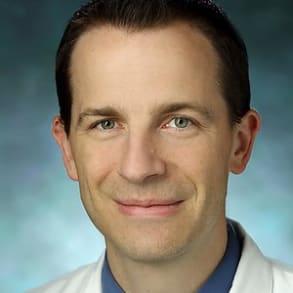Johns Hopkins sinus and skull base surgeon Nyall London describes the first international consensus statement on sinonasal tumors, which consists of four groups: general principles, benign neoplasms, malignant tumors, and quality of life and surveillance. Read the full statement at hopkins.org/4bFjsdw .
Hello, my name is Nile London and I am a head neck skull based surgeon at Johns Hopkins and the National Cancer Institute specializing in open and endoscopic resection of sinonasal malignancies and translational research for these tumors. I'm excited to tell you about a recent international multi institutional multidisciplinary initiative to provide the first international consensus statement for senton nasal tumors drawing from the most up to date evidence in their treatment and management. I was one of the associate editors for this endeavor which included over 200 authors from around the world and various specialties including otolaryngology, neurosurgery, radiation, oncology, medical oncology, pathology and others. Nasal tumors are rare. And our goal was to provide an international evidence based consensus statement for use as a comprehensive resource by physicians and trainees. Each section drew from the available published evidence in the literature as well from expertise from authors specializing in each of these individual pathologies and went through a rigorous iterative consensus building and review process. The statement itself consists of four major sections namely general principles, benign neoplasms and lesions, malignant neoplasms and quality of life and surveillance. The document encompasses 48 conceptual and histopathology based topics relevant to Cyon nasal neoplasms and masses. These range from benign pathologies such as inverted papilloma and juvenile nasopharyngeal angiofibroma to malignancies such as olfactory neuroblastoma, Cyon nao squamous cell carcinoma, naso fingal carcinoma and many others. This was a very collaborative and labor intensive endeavor. And key editors for this statement included Dr Ed Kwan from UC Irvine as primary editor, Dr Jim Palmer from University of Pennsylvania, a senior editor, other associate editors. In addition to myself included Dr Eric Wang from University of Pittsburgh, Dr Nan Nada from University of Pennsylvania. Dr Shirley Suo from MD Anderson, and Dr Marilyn Wang and Dr Dan Beswick from UCL A. We would encourage you to read and take advantage of this valuable new resource and hope that it will be helpful in treating patients with these uncommon tumors.



